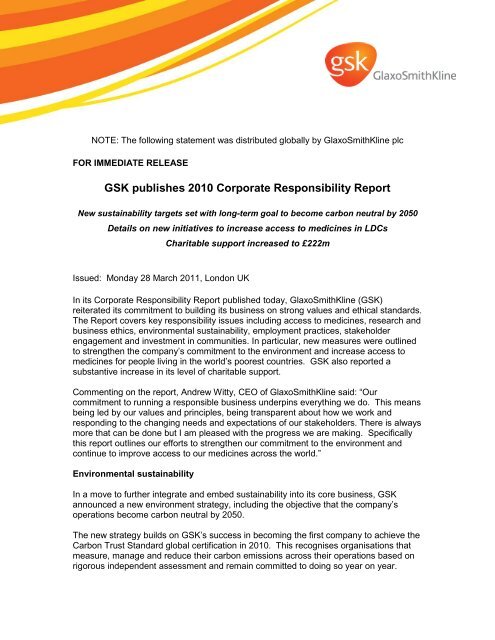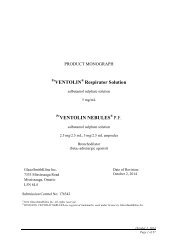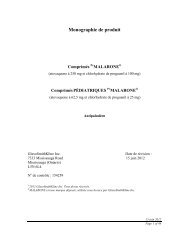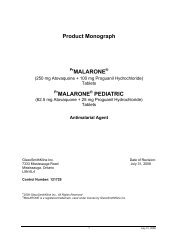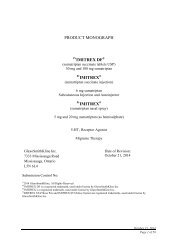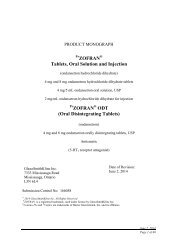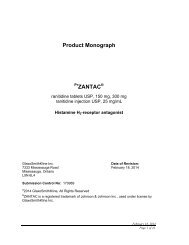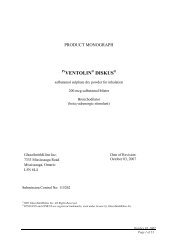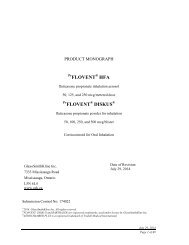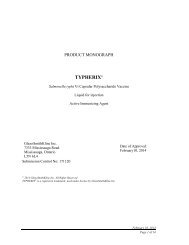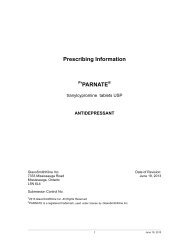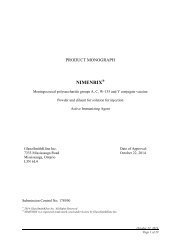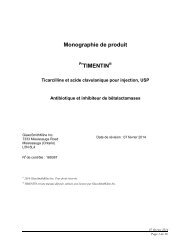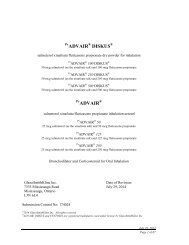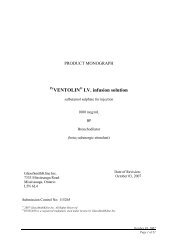View as PDF - GlaxoSmithKline
View as PDF - GlaxoSmithKline
View as PDF - GlaxoSmithKline
- No tags were found...
You also want an ePaper? Increase the reach of your titles
YUMPU automatically turns print PDFs into web optimized ePapers that Google loves.
NOTE: The following statement w<strong>as</strong> distributed globally by <strong>GlaxoSmithKline</strong> plcFOR IMMEDIATE RELEASEGSK publishes 2010 Corporate Responsibility ReportNew sustainability targets set with long-term goal to become carbon neutral by 2050Details on new initiatives to incre<strong>as</strong>e access to medicines in LDCsCharitable support incre<strong>as</strong>ed to £222mIssued: Monday 28 March 2011, London UKIn its Corporate Responsibility Report published today, <strong>GlaxoSmithKline</strong> (GSK)reiterated its commitment to building its business on strong values and ethical standards.The Report covers key responsibility issues including access to medicines, research andbusiness ethics, environmental sustainability, employment practices, stakeholderengagement and investment in communities. In particular, new me<strong>as</strong>ures were outlinedto strengthen the company’s commitment to the environment and incre<strong>as</strong>e access tomedicines for people living in the world’s poorest countries. GSK also reported <strong>as</strong>ubstantive incre<strong>as</strong>e in its level of charitable support.Commenting on the report, Andrew Witty, CEO of <strong>GlaxoSmithKline</strong> said: “Ourcommitment to running a responsible business underpins everything we do. This meansbeing led by our values and principles, being transparent about how we work andresponding to the changing needs and expectations of our stakeholders. There is alwaysmore that can be done but I am ple<strong>as</strong>ed with the progress we are making. Specificallythis report outlines our efforts to strengthen our commitment to the environment andcontinue to improve access to our medicines across the world.”Environmental sustainabilityIn a move to further integrate and embed sustainability into its core business, GSKannounced a new environment strategy, including the objective that the company’soperations become carbon neutral by 2050.The new strategy builds on GSK’s success in becoming the first company to achieve theCarbon Trust Standard global certification in 2010. This recognises organisations thatme<strong>as</strong>ure, manage and reduce their carbon emissions across their operations b<strong>as</strong>ed onrigorous independent <strong>as</strong>sessment and remain committed to doing so year on year.
Specifically, the Carbon Trust <strong>as</strong>sessed and certified GSK’s carbon footprint over a threeyear period across 65 countries, 200 sites and eight business divisions.Key elements of GSK’s new environment strategy include:A commitment to a long-term goal for company operations and the value chain tobe carbon neutral by 2050. This target means there will be no net greenhouseg<strong>as</strong> emissions from manufacturing, distribution, use and disposal of products andthe sourcing of raw materials.Interim targets to reduce GSK’s overall carbon footprint by 10% by 2015 and25% by 2020.Target set to reduce GSK’s operational water consumption by 20% by 2015 andto reduce w<strong>as</strong>te to landfill from operations by 25% by 2015 and to zero by 2020.Delivering sustainable operations with financial benefits – the company estimatesit can save £100m per annum by 2020 through reduced energy, materials anddistribution costs.Access to medicinesGSK acknowledges that much still needs to be done by all stakeholders includingbusiness, Governments and NGOs, to tackle the issue of access to medicines indeveloping countries. Nevertheless the company continues to take substantive steps toreform its business practices, including adopting a range of flexible pricing models, toexpand availability of its medicines and vaccines to <strong>as</strong> many of the people who needthem <strong>as</strong> possible.In July 2010, GSK also created a specific Developing Countries and Market Access(DCMA) business unit dedicated to incre<strong>as</strong>ing patient access to GSK medicines whileexpanding the company’s presence and helping it to build a sustainable business indeveloping countries. The unit’s success will be judged not only on profits, but also onits contribution to incre<strong>as</strong>ing access to medicines.Following GSK’s commitment to reduce prices of its patented medicines in LDCs to nomore than 25% of their price in the UK (or in France for products not sold in the UK),sales volumes for the majority of products have incre<strong>as</strong>ed significantly. For example, inE<strong>as</strong>t Africa the prices for GSK patented brands (Avamys, Avandamet, Avodart, Flixotide,Malarone and Seretide) were reduced by an average of 69% and the number of packssold incre<strong>as</strong>ed more than fourfold (320%) by the end of 2010.GSK also repeated its pledge to price its malaria candidate vaccine (RTS,S) responsiblyand at a level which is affordable for African countries. The vaccine is currently in latestageclinical development, and if approved, will be the first vaccine against malaria, withthe potential to save the lives of millions of children across Africa. GSK h<strong>as</strong> committedto price the vaccine at a level that covers costs and generates a small return of aroundfive per cent which it will reinvest in the development of future vaccines for malaria orother products for dise<strong>as</strong>es of the developing world.Although progress is being made, only one third of the 15 million people living with HIVin sub-Saharan Africa who need therapy are receiving it. To contribute to efforts toimprove availability of medicines, ViiV Healthcare, a global specialist HIV companyestablished by GSK and Pfizer, extended its policy on voluntary licences in 2010.Voluntary licences are granted by patent holders to allow generics companies to2
manufacture and sell their products. ViiV Healthcare h<strong>as</strong> now granted 11 voluntarylicences for its ARVs, an incre<strong>as</strong>e from eight when the company w<strong>as</strong> formed. Itslicensees supplied over 594 million tablets of their versions of Epivir and Combivir toLDCs and sub-Saharan Africa in 2010. This represents 35% growth over 2009. ViiVHealthcare does not receive any royalties for granting voluntary licences to genericcompanies.Charitable supportGSK announced that global giving to charitable initiatives in 2010 totalled £222m, anincre<strong>as</strong>e of 36% over the previous year (on a like-for-like b<strong>as</strong>is). The £222m comprises£147m of product donations, £53m of c<strong>as</strong>h donations, £18m of management costs and£4m of in-kind donations.The company’s giving w<strong>as</strong> higher than in 2009 due to the expansion of key programmesincluding product donations for the US Patient Assistance Programme and donations ofalbendazole to the Global Alliance to Eliminate Lymphatic Filari<strong>as</strong>is.Through the Alliance, GSK h<strong>as</strong> donated almost two billion tablets of albendazole andhundreds of millions of people have been treated through m<strong>as</strong>s drug administrations in54 countries.After discussions with the World Health Organization and other health experts, inOctober 2010 GSK committed to expanding its donation of albendazole to enabletreatment of all school-age children in Africa against intestinal worms from 2012onwards. The donation will have a major impact on children’s educational performance,physical wellbeing, school attendance and nutrition.The full report can be found at www.gsk.com/responsibility/cr-report-2010. It covers keyresponsibility issues including access to medicines, research and business ethics,environmental sustainability, employment practices, stakeholder engagement andinvestment in communities.About <strong>GlaxoSmithKline</strong> Inc.<strong>GlaxoSmithKline</strong> (GSK) is a leading research-b<strong>as</strong>ed pharmaceutical company with achallenging and inspiring mission: to improve the quality of human life by enablingpeople to do more, feel better, and live longer. This mission gives GSK the purpose todevelop innovative medicines, vaccines and healthcare solutions that help millions ofpeople. GSK is consistently recognized <strong>as</strong> one of the 50 best employers in Canada andis a top 15 investor in Canadian research and development, contributing more than $144million in 2009 alone. With a proud tradition of charitable and community support, GSK isdesignated a Caring Company by Imagine Canada. Discover more at GSK.ca.For more information, ple<strong>as</strong>e contact:Corporate Communications<strong>GlaxoSmithKline</strong> Inc.905-819-3363- 30 -3
Cautionary statement regarding forward-looking statementsUnder the safe harbor provisions of the U.S. Private Securities Litigation Reform Act of 1995, GSK cautions investorsthat any forward-looking statements or projections made by GSK, including those made in this announcement, aresubject to risks and uncertainties that may cause actual results to differ materially from those projected. Factors thatmay affect GSK' s operations are described under 'Risk Factors' in the 'Business Review' in the company' s AnnualReport on Form 20-F for 2010.4


